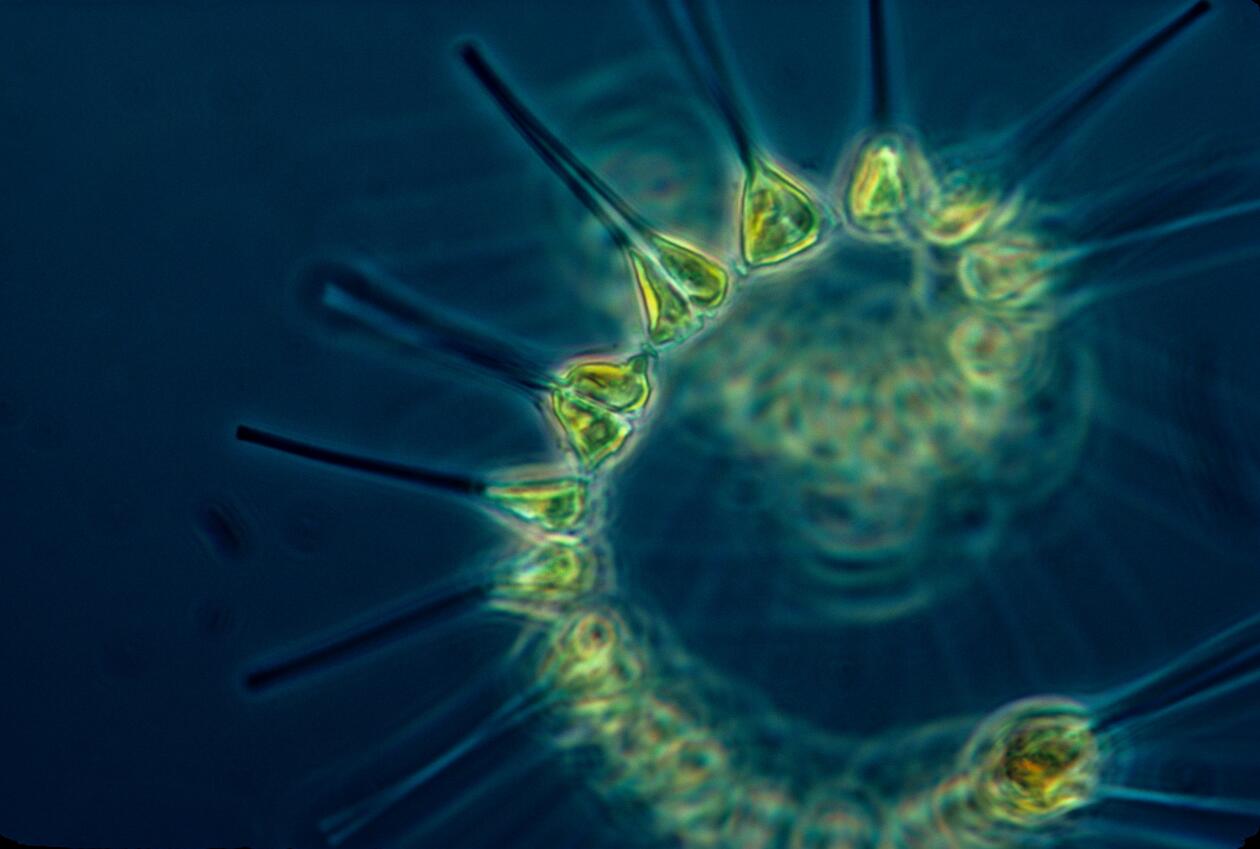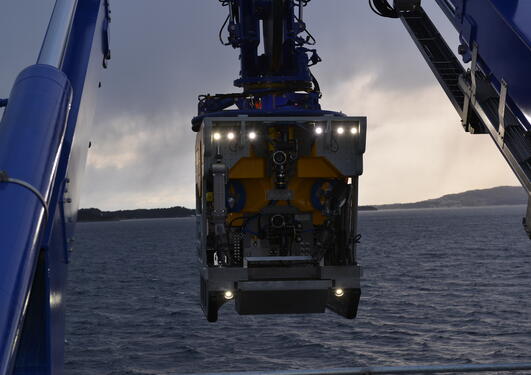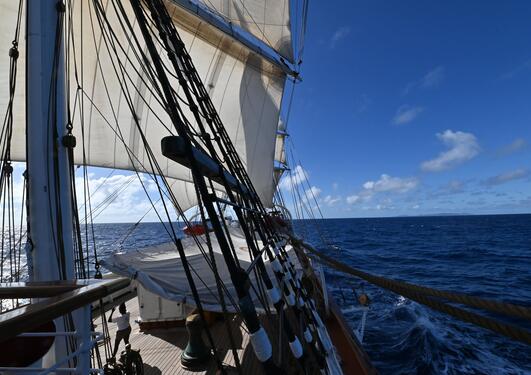OCEAN FUTURES 2030: Science and diplomacy for ocean governance – our common ocean
This special science diplomacy event on the ocean/climate/biodiversity nexus brought together different stakeholders to discuss how to protect, explore, exploit, and share the goods from the high seas as the common heritage of humankind. The event was attended by 130 people from more than 40 countries.
Hovedinnhold
UPDATE! There is now a policy brief to download here based on the outcomes from the event. For questions about the event, please send an email to Ocean Futures 2030.
OCEAN FUTURES 2030:
Science and diplomacy for ocean governance – our common ocean
Organised by the University of Bergen
with co-organisers:
UiT – The Arctic University of Norway
Arctic Frontiers
EU Science Diplomacy Alliance
The Organisation of African, Caribbean and Pacific States (OACPS)
When and where:
Wednesday 21 February 15:15-17:30
Mission of Norway to the EU, Norway House, Rue Archimède 17, 1000 Brussels
Life in the high seas/deep ocean/ocean commons is an accelerating concern for the COPs of the conventions on climate change and biological diversity. Within the past 15 months two ground-breaking new agreements addressing the urgency of preserving biological diversity have been adopted at the United Nations (UN) level and are now in the (pre)implementation stages in the UN member states:
- In December 2022 policy makers, scientists and diplomats met in Montreal for the COP15 meeting of the UN Convention on Biological Diversity (CBD) and agreed on the Global Biodiversity Framework (GBF), which has created a platform for the world to preserve and take care of nature at large.
- In March 2023, after 19 years the negotiations in the Intergovernmental Conferences on Biodiversity Beyond National Jurisdiction (BBNJ) finally reached its conclusion with the UN member states’ agreement for the high seas/ocean commons, which states that the high seas are the common heritage of humankind.
In this event, we aim to bring together stakeholders from science, diplomacy, and representatives from the EU Commission to discuss converging ocean-related themes across the recently adopted Biodiversity Beyond National Jurisdiction (BBNJ) agreement and the Convention on Biological Diversity (CBD) with the COP15 framework for biological diversity.
- The event is free and open to all.
The event aims to give disparate voices from the global south a platform, with a stated goal of fostering south/south/north cooperation (exemplified by the Organisation of African, Caribbean and Pacific States – OACPS and the Cotonou and Samoa agreements), increase ocean science diplomacy globally, and create dialogue to strengthen the impact and visibility of global south perspectives. UiB has more than 60 years of collaborations with partners in the global south and has also worked closely with global south partners on the science-policy nexus, e.g. at high-level meetings. Partnering up with OACPS for this event is a natural extension of the university's activities both towards the global south and in science diplomacy.
As the initiator for the High-Level Panel for a Sustainable Ocean Economy, Norway has a strong commitment to the ocean. The event will underline the strong connection between Norway and other ocean nations, not the least the Small Island Developing States (SIDS). This entails a commitment to strengthen ocean science across disciplines and increase mutual capacity-building. By using the Brussels arena for this, the event aims to reach policymakers in general and within the EU in particular.
The Norway-EU Science Diplomacy Network, funded by the Research Council of Norway, facilitates this special event where the scientific community will engage in knowledge exchange with diplomats, representatives from the EU Commission and other stakeholders to discuss the ocean/climate nexus, with a particular focus on biodiversity considering these recent agreements.
The event is moderated by Professor Edvard Hviding, social anthropologist from the University of Bergen.
PROGRAMME
15:15-15:25 Welcome and opening statement
- Welcome by Minister Counsellor Eirik Nestås Mathisen from the Mission of Norway to the EU
- Opening statement by MEP Catherine Chabaud, Renew Europe Group and Mouvement Démocrate (France)
15:25-16:15 Session 1: The ocean governance conversation
This session offers a vivid and free-flowing conversation about the frameworks we have for ocean governance within the BBNJ/COP15-CBD nexus and the ocean/climate/biodiversity nexus bringing a global perspective to the heart of Europe.
Professor Edvard Hviding, social anthropologist from the University of Bergen with four decades of research experience from the Pacific Islands and a long record of ocean-focused science diplomacy at the United Nations, in conversation with:
- Ms. Cristelle Pratt, Assistant Secretary-General for the Environment and Climate Action at the Organisation of African, Caribbean and Pacific States (OACPS)
- Professor Lise Øvreås, President of the Norwegian Academy of Science and Letters (DNVA) and Vice-President of the European Academies Science Advisory Council (EASAC)
Respondent:
- Dr. Irina Pavlova, Science Project Officer at UNESCO in Brussels
The conversation will be followed by a Q&A.
16:15-17:15 Session 2: Looking towards the future of ocean governance
What will the ocean governance of the future be like? This is the key question framing the second and final session of the day, where five distinguished speakers with different backgrounds in ocean science and science diplomacy join forces. Each panel member bringing their own wide-ranging perspectives regarding the ocean governance of the future. The EU Science Diplomacy Alliance has made Ocean Science Diplomacy one of its Thematic Entry Points (TEP) and the event supports this initiative.
Building on the first session we ask:
- How can scientists contribute to the ocean governance of the future?
- Are the existing frameworks for ocean governance fit for the future?
- What interactions can be devised between mechanisms to ensure an ocean governance fit for the future?
Panellists:
- Professor of Northern Studies and Barents Chair in Politics Rasmus Gjedssø Bertelsen from UiT – the Arctic University of Norway
- Dr. Sam Robinson, Research fellow at the University of York
- Mr. Peter Nyongesa Wekesa, Fisheries Expert for the Organisation of African, Caribbean and Pacific States (OACPS)
- Dr. Jenny Turton, adviser and project manager at Arctic Frontiers
- Dr. Sheila Heymans, Executive Director of the European Marine Board
Respondents:
- H.E. Mr. José Filomeno de Carvalho Dias Monteiro, the Ambassador of the Republic of Cabo Verde, on behalf of OACPS
- Dr. Despina Symons, Director at the European Bureau for Conservation and Development (EBCD)
Session moderator:
- Dr. João Bettencourt, oceanographer from the University of Bergen, where he is a SEAS postdoctoral fellow. SEAS is a career and mobility fellowship programme within marine sustainability. The project is funded through EU Horizon 2020 under the Marie Skłodowska-Curie grant agreement No 101034309.
The panel debate will be followed by a Q&A.
17:15-17:30 Closing remarks
To close the event we have invited three speakers who will bring different perspectives to the two sessions on the ocean governance framework discussed at at the event. They will also present examples from the past and present as well as emerging trends on science diplomacy for ocean governance.
- Coordinator Science Diplomacy and Multilateral Relations Jan Marco Müller, European Commission, DG Research and Innovation
- Director Raschad Al-Khafaji, FAO Liaison Office with the European Union and Belgium
- H.E. Ms. Maureen Francella Strickland, the Ambassador of the Independent State of Samoa, on behalf of OACPS
- The event is followed by a reception from 17:30 to 18:30.
- Official hashtags for the event: #OF2030 and #OceanFutures2030
- Suggested additionalhashtags: #ForTheOcean #SDG14 #OceanDecade #ScienceDiplomacy #BBNJ #CBD #nexus #ocean #climate #biodiversity


